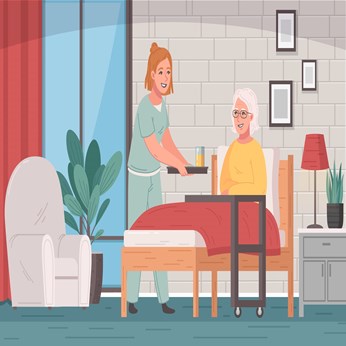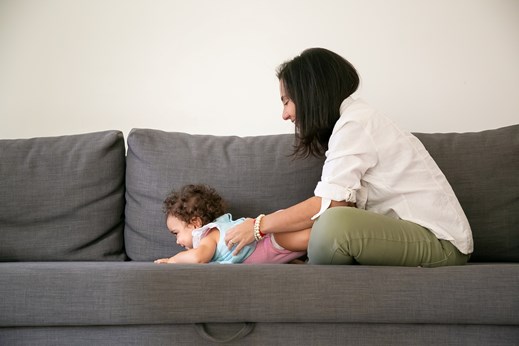7 Helpful Sleep Tips For Elders
Elders tend to sleep lesser than young people due to various reasons; insomnia could severely affect their physical and mental functioning and make them susceptible to fatigue and a wide variety of health problems. It is also important to note that sleep also helps the body to regenerate and recharge itself; so we need to keep track of our elder’s sleeping patterns and help them get quality and quantity sleep.
It would help elders to follow 7 tips for good sleep:
1) It is necessary that caregivers like us insist on the elder having a check-up to rule out any underlying health problem that could be responsible for the inability or difficulty in sleeping. It is necessary to be sensitive to the elder’s sleeping pattern and problem; consulting a doctor may help get sleeping aids if deemed necessary.
2) Elders should not avoid the sun; though excessive sunshine increases ones risk of skin cancer, sunlight in moderation is good for elders. Sunlight not only promotes the body’s ability to produce Vitamin D that helps build strong bones, but it also increases the body’s ability to produce melatonin; melatonin helps seniors to not only get good sleep, but also to stay asleep longer.
3) Seniors have to urge to visit the toilet far more often than the young especially during the night. So it would help to minimize liquids a few hours before bedtime. Also caffeine hinders quality sleep in some elders; so it is best to avoid it after late afternoon. The same thing applies to alcohol that should be avoided close to bedtime.
4) Most seniors are on a variety of medications for their different health problems; some of these medications have side effects that make it difficult for the elder to sleep. Performing an analysis of the medications would help change the time of the medication that could help the elder sleep longer and well.
5) Create an environment in the bedroom that is conductive to sleep; the bedroom should be used only for sleep and nothing else. The room should be kept dark and cool and free of noises and other stimulating activities. This makes for an ideal atmosphere for quality sleep.

6) It would help seniors to get quality sleep at night by controlling napping; seniors surely need rest, so naps should be either in the late morning or early afternoon for a maximum period of 15 to 45 minutes. Also naps should be in a comfortable place as the bedroom.
7) It is best to create a bedtime routine and avoid doing stimulating activities like hearing the news or reading something exciting just before bedtime. It would help to hear some soothing music or read a philosophical book at bedtime; this enables the mind and body to get slowly prepared for sleep. Creating a calm bedtime routine would make it easier for the elder to get good sound sleep at night.
I hope these 7 tips prove useful for both elders as well as caregivers to induce good quality sleep. Do share if you have any more tips to induce good sleep with the readers of indiapulse.sulekha.com.
Image Courtesy: Google
Take the next step toward your goals
Share your requirement and find the best care providers in your area
-
Looking for a caretaker’s job? Build your profile and get in touch with families in your vicinity.
-
Discover nannies, babysitters, cooks, housekeepers, pet sitters, and elder care under one roof.
-
Get all the support you need to run a successful care center.
-
Search for appropriate centers near you depending on your needs.
Care Corner Insights: Blog Library

Elder Care in Toronto: How to Find Trusted, Loving Support for Your Aging Loved Ones
"Toronto’s Ultimate Guide to Elder Care: Because They Deserve the Best—And So Do You!" 1. The Urgent Need for Elder Care in Toronto "Toronto’s senior population is growing fast—by 2026, 1 in 4 Torontonians will be over 65 (City of Toronto, 202

Compassionate Homecare: Your Trusted Partner in Vancouver
In today’s fast-paced world, ensuring loved ones receive the care they need can be overwhelming, especially if they require assistance due to age, illness, or disability. Sulekha Care Services offers a solution that eases this burden, connecting care

Navigating Elder Care in Toronto: A Guide for Families Seeking Peace of Mind (and Top-Notch Care!)
The Growing Need for Elder Care in Toronto "Toronto’s aging population is booming—by 2026, 1 in 5 Torontonians will be over 65 (City of Toronto, 2025). With families balancing careers, kids, and life’s chaos, finding reliable, compassionate elder ca

Finding the Right Nanny or Babysitter in Vancouver
Because Your Child Deserves More Than “Just Help” Raising a child in a vibrant city like Vancouver is beautiful—but let’s be honest, it can also be overwhelming. Between work schedules, school timings, and daily responsibilities, parents often find

7 Expert-Approved Tips to Hire and Manage a Nanny the Smart Way
Hiring a nanny is one of the most important decisions for any family. You’re trusting someone with your child’s safety, emotional well-being, and daily growth. Whether you're a first-time parent or hiring again, the process becomes much easier when y

Finding Your "Mary Poppins" in the 6ix: The Stress-Free Way to Childcare in Toronto
Toronto is a city that never stops. From the bustling corridors of the Financial District to the vibrant neighborhoods of Scarborough and Etobicoke, life in the GTA is a beautiful, fast-paced whirlwind. But for parents, that whirlwind often comes wit

Because They’re Family: Finding Loving Pet Care When You’re Away
Pets Aren’t Just Pets. They’re Home. From wagging tails that erase bad days to gentle purrs that stitch silence into comfort, pets are emotional anchors. When life pulls you away—work trips, emergencies, or long hours—the biggest worry isn’t who wil

Because Your Pet Deserves More Than Just Care
Finding Trusted Pet Care Providers with Sulekha Care Services Pets aren’t hobbies. They’re family members with fur, feathers, whiskers, and very strong opinions about meal timings. Whether it’s a wagging tail greeting you at the door or a cat preten

Why Toronto Parents Prefer Home-Based Childcare
A Warm, Trusted, Toronto-Style Approach to Raising Little Ones For parents in Toronto, finding the right childcare isn’t just a task—it’s an emotional decision. This city moves fast, hums with energy, and thrives on diversity, but its parents want s

Best Child Care Hacks for Busy Indian Moms and Dads in the U.S.
Balancing work, home, and parenting is challenging, especially for Indian parents living in the U.S. Between cultural expectations, school schedules, extracurricular activities, and household responsibilities, managing daily life can often feel overw